Micropropagation
Plant in vitro technology is applied for vegetative reproduction (propagation) allowing large-scale and year-round production of plants for short time period (about 90 days).
-
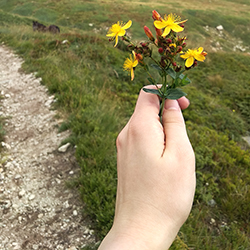
Selection of donor-plant
The plant with elite characteristics could be selected by the customer.
-
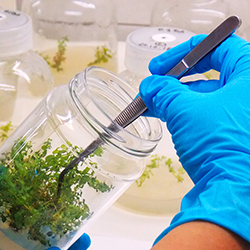
Isolation of primary explants
The primary explants (buds, leaves, stems or roots) for propagation could be isolated either from field-grown plants that undergo to process of surface sterilization or directly from aseptically germinated seeds.
-
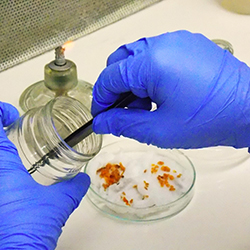
Inoculation of explant
The explants are inoculated on nutrient medium supplemented with phytohormones (cytokinins/auxins) to induce growth and development of new plant shoots. In vitro plants are maintained in growth chambers with well-controlled temperature, light and humidity. This phase of new plants induction takes 30-40 days.
-
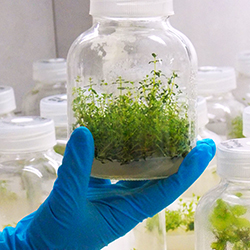
Multiplication of explants
The multiplication of plant shoots is performed by their subcultivation on fresh medium with high concentration of cytokinins to obtain indefinite number of lateral shoots (axillary branching). In optimal in vitro conditions, plant multiplication takes about 30 days.
-
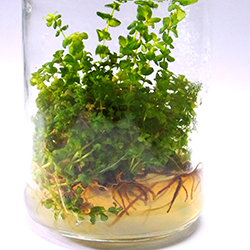
Rooting of multiplied shoots and regeneration of whole plantlets
Multiplied plant shoots are subcultured on а rooting medium with auxins for regeneration of whole in vitro plants. The rooting (rhizogenesis) of plants is achieved for about 30 days.
-

Acclimatization
The acclimatization of in vitro plants is а key step of their successful adaptation to ex vitro conditions. In vitro plants are transferred into sterile mixture of send, perlite and peat (1:1:1) and kept under controlled conditions in culture room or green house (10-14 days).
-

Adaptation
The acclimatized plants are then transferred to outdoor conditions.